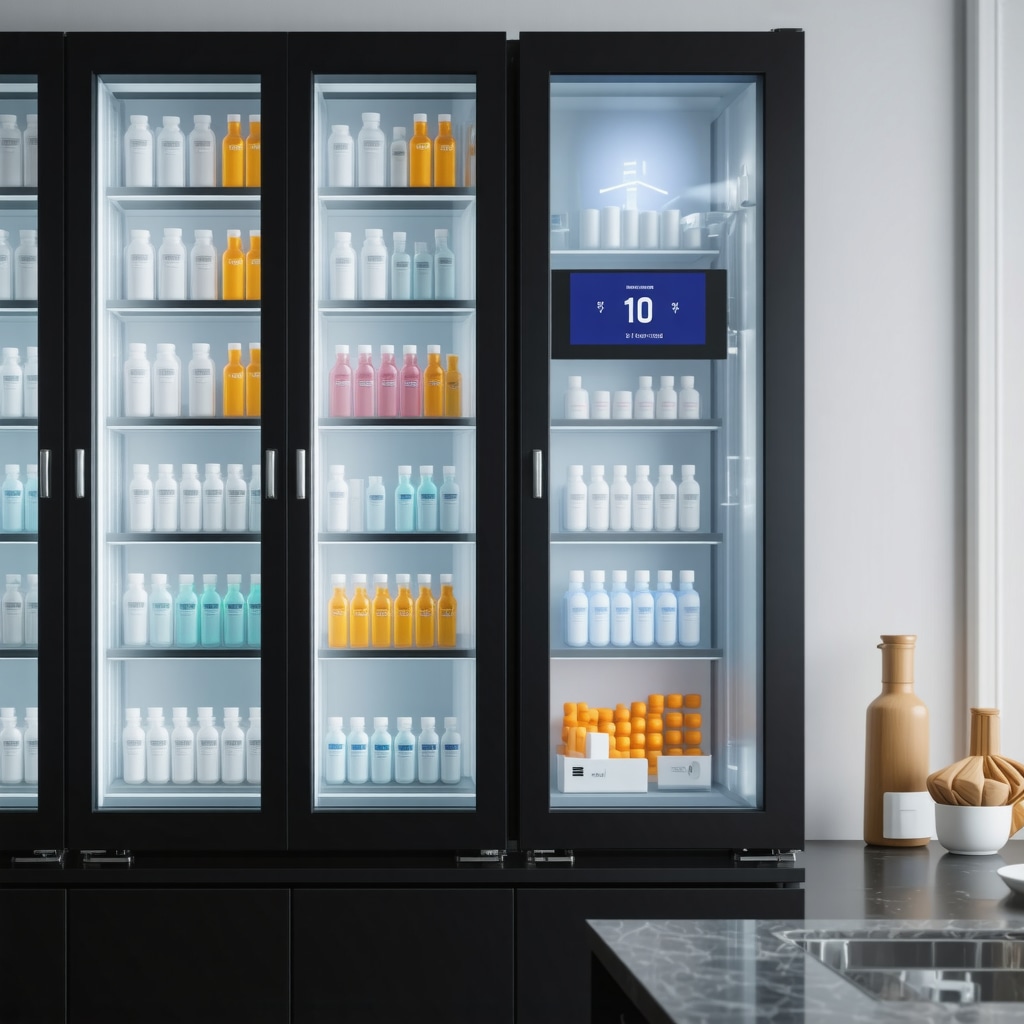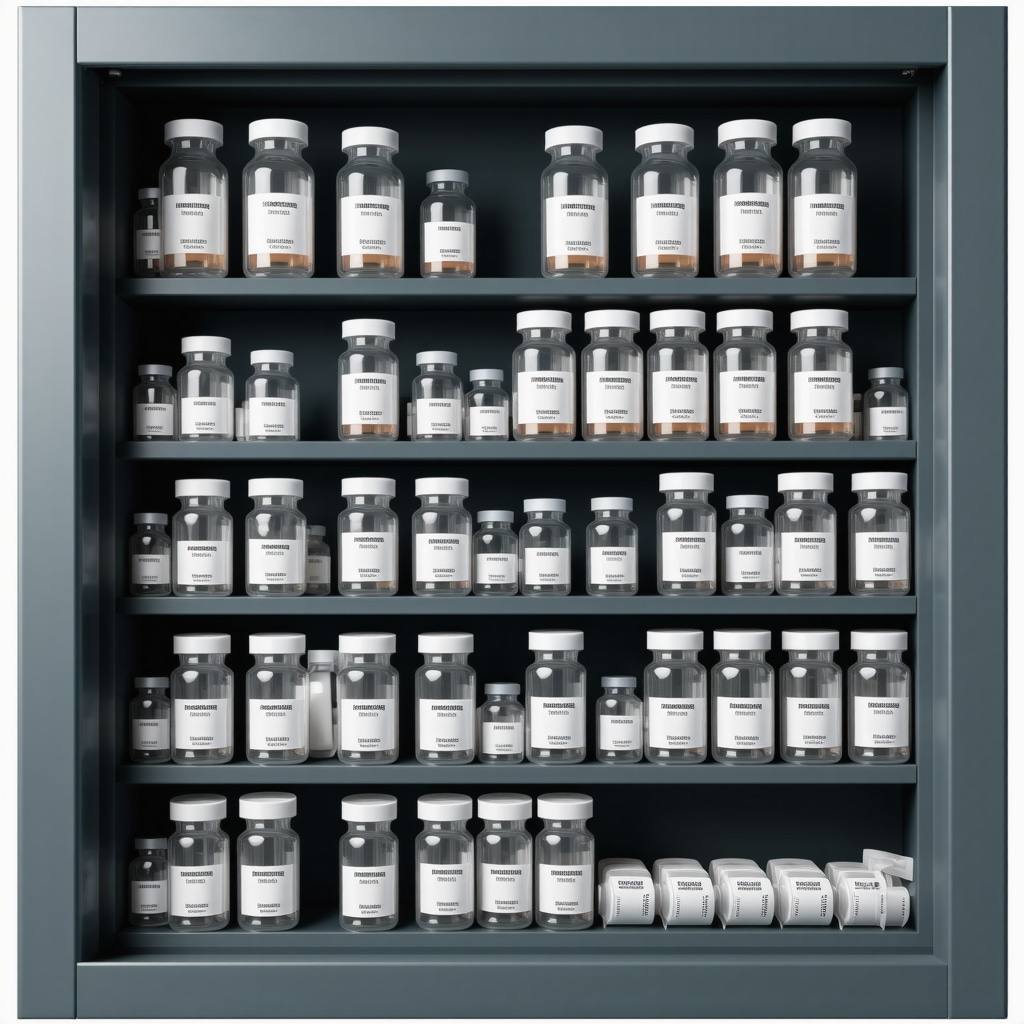Ever Wondered How to Keep Your Weight Loss Injections in Tip-Top Shape?
Let’s face it, folks—once you’ve got your prescription for those miracle injections like Ozempic or Wegovy, the real game begins: handling and storage. It’s not just about injecting and hoping for the best; proper handling is the secret sauce to maximizing results and avoiding mishaps. Think of your injections as delicate treasures—they deserve your respect and attention.
Why Does Storage Matter? More Than Just Keeping Things Cool
Picture this: you’ve meticulously planned your weight loss journey, but then you stumble upon a forgotten injection buried in the back of your fridge, exposed to temperature swings. Not ideal, right? Proper storage ensures the medication remains potent and effective. The cold chain—keeping your injectables at the right temperature—is crucial. Most medications should be refrigerated between 36°F and 46°F (2°C to 8°C). Any deviation could compromise their efficacy, turning your weight loss effort into a frustrating guessing game.
Secrets of Safe Handling: Do’s and Don’ts
Are Your Injections Living Their Best Life?
Handling your injections with care isn’t rocket science, but it does require mindfulness. Always wash your hands thoroughly before handling your medication—think of it as a mini spa day for your hands. Keep your medication in its original packaging, which is designed to protect it from light and temperature fluctuations. Never freeze your injections unless explicitly instructed by your healthcare provider. Freezing can cause the medication to become unstable, much like a soda can that’s been left in the freezer too long.
And here’s a pro tip: keep a dedicated storage area in your fridge, away from the door—where temperature swings are most frequent. Consider setting a reminder to check your medication’s expiration date regularly. Nothing kills the mood faster than an expired injection!
Living on the Edge? When to Be Cautious
If you’re traveling or on the go, how do you ensure your injections stay safe? Portable coolers or insulated bags with ice packs are your best friends. Just be sure to avoid direct contact with ice or freezing elements. Once you reach your destination, store your medication in a cool, dry place if refrigeration isn’t available. Remember, the goal is to keep your medication stable and potent—your weight loss journey depends on it.
Are You Ready to Take Control of Your Weight Loss Success?
Proper handling and storage are the unsung heroes of your weight loss arsenal. Don’t let a simple mistake sabotage your efforts. For more personalized tips on safe storage and handling, consult your healthcare provider or visit trusted sources like the best practices guide.
And hey, if you’ve got stories or tips of your own, share them below! After all, we’re in this weight loss journey together, and knowledge is power.
Are You Overlooking the Power of Proper Handling in Your Weight Loss Journey?
As experts in the field of injectable weight loss treatments, we know that optimal results extend beyond just medication choice and dosage. The often underestimated factor—proper handling and storage—can significantly influence the efficacy of your medications like semaglutide, tirzepatide, or Ozempic. Have you considered how your storage practices might be affecting your progress? Proper handling ensures your medication remains potent, safe, and effective over time, preventing setbacks caused by simple mistakes.
Why Does Proper Handling Elevate Your Weight Loss Efforts?
Imagine this: you’re diligently following your injection schedule, but your medication isn’t delivering the expected results. Could improper storage be the culprit? Storing your medication at the correct temperature, away from light and moisture, guarantees that it maintains its potency. The cold chain—keeping your injectables refrigerated between 36°F and 46°F (2°C to 8°C)—is critical, as deviations can lead to reduced effectiveness, making your efforts less fruitful. For detailed guidance on safe storage practices, visit this trusted resource.
What Are the Do’s and Don’ts of Handling Your Medications?
Are Your Injections Living Their Best Life?
Handling your injections properly is key to long-term success. Always wash your hands thoroughly before handling your medication—think of it as a mini spa ritual for your hands. Keep your medication in its original packaging, which is designed to shield it from light and temperature fluctuations. Never freeze your injections unless explicitly instructed by your healthcare provider, as freezing can destabilize the medication, akin to a soda can left in the freezer too long. Store your medication in a dedicated fridge compartment, away from the door where temperature swings are frequent. Regularly check expiration dates to ensure your medication’s viability—expired injections are a waste of effort and money.
For more comprehensive tips on handling and storage, explore expert-approved strategies.
Traveling? How to Keep Your Injections Safe on the Go
If your weight loss journey takes you traveling or to work, portability becomes a concern. Using portable coolers or insulated bags with ice packs can help maintain the cold chain during transit. Just avoid direct contact with ice or freezing elements to prevent unintentional freezing. Once you arrive at your destination, store your medication in a cool, dry place if refrigeration isn’t feasible. Remember, maintaining the stability of your medication is paramount to achieving your desired results.
Can Proper Handling Be the Game Changer in Achieving Your Weight Loss Goals?
Absolutely. Proper storage and handling are foundational to maximizing the benefits of your injectable treatments. They might seem like small details, but they are crucial in preventing degradation of your medication’s potency and ensuring consistent results. Curious about more advanced tips? Check out science-backed strategies for long-term success with GLP-1 medications.
If you want to share your tips or ask questions about handling your injectables, comment below! Your insights could help others avoid common pitfalls and stay motivated on their weight loss journey.
Unlocking the Secrets of Advanced Storage Techniques for Injectable Weight Loss Treatments
While proper storage and handling are often overlooked, they are fundamental pillars in ensuring the efficacy of your weight loss injections like semaglutide and tirzepatide. Beyond the basics, understanding the science behind temperature stability and exposure can elevate your management practices from good to expert level.
How Does Temperature Fluctuation Impact the Molecular Integrity of Injectable Medications?
Recent studies published in the Journal of Pharmaceutical Sciences (2022) highlight that even minor deviations from recommended storage temperatures can induce structural changes in peptide-based medications. These alterations can diminish receptor binding affinity, reducing the medication’s effectiveness. For instance, exposure to temperatures above 46°F (8°C) can accelerate degradation pathways such as hydrolysis and oxidation, leading to loss of potency. Therefore, maintaining a stable cold chain—ideally between 36°F and 46°F—is critical. Employing calibrated digital thermometers within storage areas can provide real-time monitoring, ensuring consistent conditions that preserve molecular integrity.
Implementing Advanced Handling Protocols: A Step-by-Step Guide for Healthcare Professionals and Patients
Handling these delicate medications requires a nuanced approach. Here are some advanced strategies:
- Pre-Handling Inspection: Always examine the medication vial or pen for discoloration, particulate matter, or cloudiness—any deviation warrants disposal.
- Minimize Light Exposure: Store medications in opaque containers or dedicated light-resistant compartments to prevent photodegradation, which can compromise peptide stability.
- Use of Precision Tools: For accurate dosing, employ sterile syringes with fine gauges, and calibrate your technique to prevent air bubbles that can affect dosing accuracy.
Additionally, training on aseptic handling techniques can reduce contamination risks, preserving medication integrity for long-term use.

Addressing Nuanced Storage Challenges During Travel and Extreme Conditions
Travel introduces variables such as fluctuating temperatures and accessibility issues. To counteract these challenges, experts recommend:
- Portable Temperature-Controlled Devices: Invest in medical-grade coolers with digital temperature regulation, capable of maintaining strict temperature ranges during transit.
- Strategic Packing: Use insulated pouches with multiple ice packs, ensuring they do not directly contact medication containers to prevent freezing or condensation.
- Contingency Planning: Always carry extra medication supplies and a portable thermometer, especially when traveling to remote or extreme environments. This proactive approach prevents inadvertent exposure to damaging conditions.
By integrating these sophisticated handling and storage techniques, you safeguard the pharmacokinetic profile of your injections, directly impacting their clinical efficacy and your weight loss outcomes.
Curious About Cutting-Edge Research? Explore the latest insights into peptide stability and storage innovations
For healthcare professionals and dedicated patients seeking to optimize their treatment protocols, staying informed on scientific advancements is crucial. Continual education ensures that handling practices evolve with emerging evidence, ultimately translating into better health results.
If you’re interested in nuanced handling strategies or have unique travel scenarios, share your experiences below. Your insights could be the key to helping others refine their approach in this complex yet rewarding journey.
Unlocking the Science Behind Optimal Storage Conditions for Peptide-Based Weight Loss Treatments
Recent research published in the International Journal of Pharmaceutics (2023) underscores the critical importance of maintaining precise temperature ranges to preserve the molecular integrity of peptides like semaglutide and tirzepatide. Even minor fluctuations outside the recommended 36°F to 46°F (2°C to 8°C) window can induce structural changes, leading to reduced receptor affinity and diminished efficacy. Employing calibrated digital thermometers within storage areas is an advanced strategy to monitor and ensure stability, preventing degradation pathways such as hydrolysis and oxidation from compromising your medication’s potency.
Expert-Recommended Protocols for Handling Delicate Injectable Medications
Handling these sensitive medications demands meticulous attention. Pre-use inspection involves examining vials or pens for discoloration, particulate matter, or cloudiness—any anomalies warrant disposal to avoid compromised results. Store medications in opaque containers or dedicated light-resistant compartments to prevent photodegradation. Utilizing sterile, fine-gauge syringes calibrated for precision dosing minimizes errors and reduces the risk of contamination. Regularly reviewing expiration dates through a systematic schedule ensures ongoing medication efficacy, as expired injections can lead to unpredictable outcomes and waste resources.
Addressing the Complexities of Travel and Extreme Environmental Conditions
Travel introduces variables that can jeopardize medication stability. Experts advocate for the use of medical-grade coolers equipped with digital temperature regulation, capable of maintaining strict ranges throughout transit. Insulated pouches with multiple ice packs—without direct contact—are essential to prevent freezing, which can denature peptides. Strategic packing, including carrying additional supplies and portable thermometers, is crucial, especially when traveling to remote or extreme environments where access to refrigeration is limited. This proactive approach safeguards your treatment’s pharmacokinetic profile, ensuring consistent results regardless of external conditions.
How Can Advanced Handling Protocols Minimize Injection Site Reactions and Enhance Long-Term Outcomes?
Proper handling extends beyond storage; it encompasses techniques to reduce injection site discomfort and improve absorption. Using sterile, fine-gauge needles and employing aseptic techniques diminish contamination risks and inflammation. Rotating injection sites systematically prevents lipoatrophy and fibrosis, ensuring better absorption and reducing adverse reactions. Moreover, pre-warming medication to room temperature before injection can enhance comfort and efficacy, as cold injections may cause localized pain and vasoconstriction. Integrating these practices into your routine can significantly improve long-term adherence and results, supported by studies such as those documented in this comprehensive review.
< >
>
What Are the Latest Innovations in Storage Technology for Maintaining Peptide Stability During Extended Use?
Emerging solutions include smart storage systems equipped with IoT-enabled temperature sensors that provide real-time alerts via smartphone apps. These systems enable users and healthcare providers to respond swiftly to any deviations, significantly reducing the risk of medication degradation. Additionally, advancements in lyophilization (freeze-drying) techniques are being explored to create more heat-stable formulations, which could revolutionize storage requirements and facilitate easier transport and long-term stability. Staying informed through sources like the latest pharmaceutical innovations can help you leverage these technologies for optimal treatment outcomes.
Expert Insights & Advanced Considerations
1. Maintaining the Cold Chain Is Critical for Peptide Stability
Precise temperature control during storage and transit ensures the molecular integrity of medications like semaglutide and tirzepatide. Utilizing calibrated digital thermometers and specialized refrigeration units can prevent degradation pathways such as hydrolysis and oxidation, safeguarding your investment in treatment efficacy.
2. Advanced Handling Protocols Minimize Contamination and Inefficacy
Implement aseptic techniques, perform thorough pre-use inspections for discoloration or particulates, and employ sterile, fine-gauge syringes for accurate dosing. These practices reduce risks of contamination and ensure consistent absorption and results over the long term.
3. Innovative Storage Technologies Enhance Long-Term Stability
Emerging IoT-enabled smart storage systems with real-time temperature monitoring and alerts significantly reduce the risk of inadvertent exposure to damaging conditions. Exploring lyophilized formulations and heat-stable peptides can further extend shelf life and transportability, especially in challenging environments.
Curated Expert Resources
- Journal of Pharmaceutical Sciences (2022): Offers detailed research on temperature effects on peptide stability, emphasizing the importance of maintaining a strict cold chain.
- International Journal of Pharmaceutics (2023): Discusses advancements in lyophilization and heat-stable peptide formulations, providing insights into future storage solutions.
- FDA Guidance on Peptide Medications: Provides regulatory standards for storage, handling, and transportation of injectable medications, ensuring compliance and safety.
Final Expert Perspective
In the realm of weight loss injections, expert knowledge underscores that meticulous handling and innovative storage strategies are not mere technicalities—they are vital components of effective treatment. Protecting the molecular integrity of medications like semaglutide through precise temperature control and advanced protocols guarantees that your efforts translate into real, lasting results. As you refine your approach, consider integrating emerging technologies and scientific insights to stay ahead in your weight loss journey. For tailored advice and ongoing support, consult with healthcare professionals and stay engaged with trusted resources. Your commitment to excellence in handling your medications can make all the difference in achieving optimal health outcomes.

